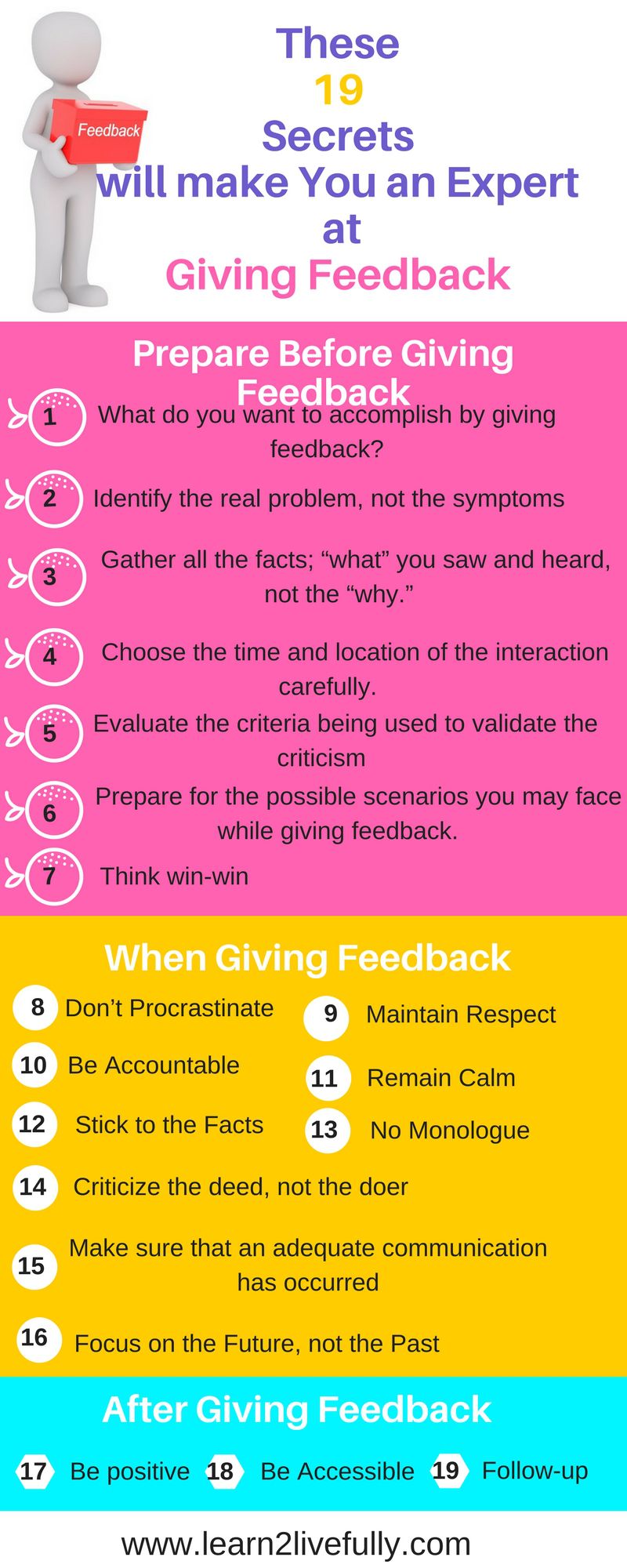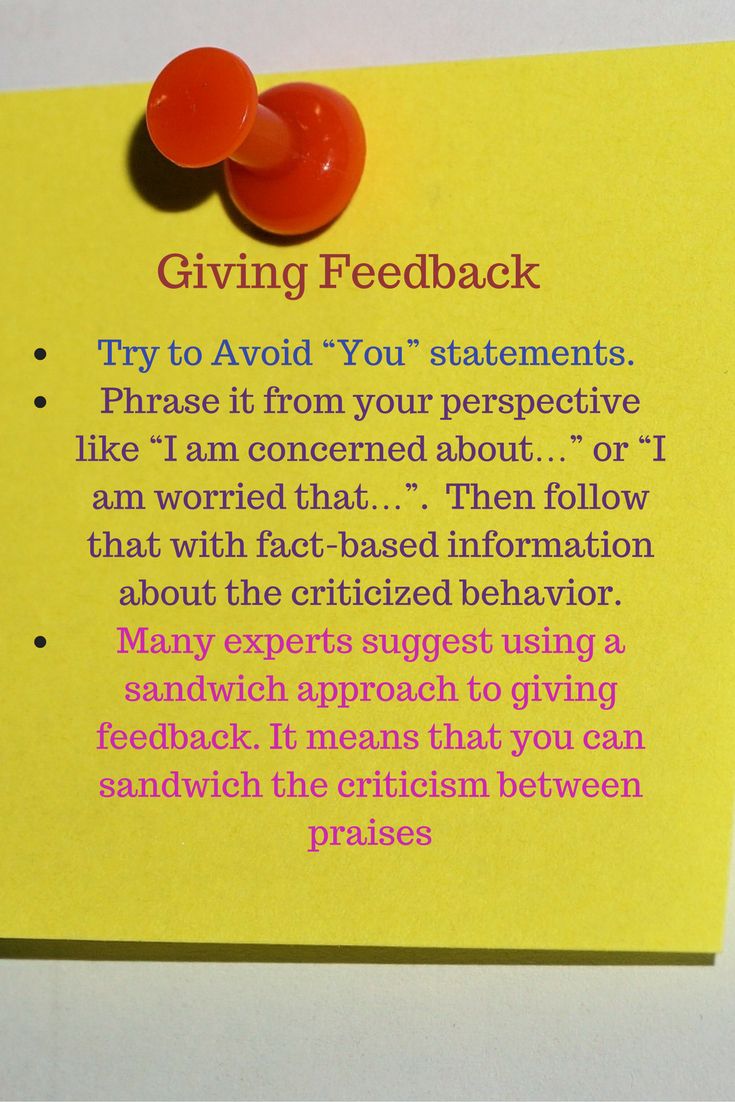Giving Feedback is not Hard Anymore! These 19 Secrets will make You an Expert at it.

 Imagine a baby learning to walk. The baby has no concern over how foolish he may look to others. He has no fear of failure. No baby pays attention to anyone saying, “your peers have already started walking!”. He keeps trying until he masters walking. Somewhere along the path of life, we begin to perceive mistakes as bad. We start to look at criticism as a proof of our flaws. This notion has made the criticism, not only hard to receive but also to give. Feedbacks are the essential part of our lives that help us to learn and grow. Do you want to improve yourself in giving feedback?
Imagine a baby learning to walk. The baby has no concern over how foolish he may look to others. He has no fear of failure. No baby pays attention to anyone saying, “your peers have already started walking!”. He keeps trying until he masters walking. Somewhere along the path of life, we begin to perceive mistakes as bad. We start to look at criticism as a proof of our flaws. This notion has made the criticism, not only hard to receive but also to give. Feedbacks are the essential part of our lives that help us to learn and grow. Do you want to improve yourself in giving feedback?
“Criticism, like rain, should be gentle enough to nourish a man’s growth without destroying his roots.” –
-Frank A. Clark
Please do not forget to subscribe to get FREE Self-improvement Tools in your mailbox.
Why is Criticism Helpful?
If we evaluate even the not well-delivered criticism, it helps us to learn more about ourselves, the situation or the critic. Even a destructive criticism helps you identify the real nature of the critic!
You may read our article on how to handle constructive criticism here.
Giving feedback is difficult.

Most of us always want to be nice to others. Criticism often leads to conflict, stress and undesirable responses.
Would you like to read more about stress? Check out our articles on major causes of stress and ways to cope with stress.
Do not criticize others if you do not intend to help them to grow, recover, improve, prosper or excel.
Would you like to have a quick look at the important points covered in this article? Watch below presentation.
Here are 19 tips to help you to be an expert in giving feedback.

Before Giving Feedback
 The process of giving feedback is not just delivering the criticism. To provide a productive and constructive criticism, you need to prepare well ahead of giving feedback. Following are some tips to help you plan for providing criticism.
The process of giving feedback is not just delivering the criticism. To provide a productive and constructive criticism, you need to prepare well ahead of giving feedback. Following are some tips to help you plan for providing criticism.
1. Goal and Motivation

What is it that you want to accomplish by giving feedback? If you are not clear as to how your criticism will help the recipient, perhaps you should postpone the criticism.
Is your underlying motive to utilize the opportunity to engage in an ego assault?
Delay the criticism till such low emotions get diminished, even if the feedback is helpful to the recipient.
2. Identify the real problem

By giving feedback, ensure you are addressing the real issue, not the symptoms.
You have asked your son to come back from the play by 6 p.m. When he returns home late for the very first time, you are addressing a rule violation issue. But when he repeats it multiple time, you need to address much more severe problems like loss of trust & confidence along with rule violation.
We are what we are because of our habits. You may read our articles on habit building here.
3. Gather all the facts

Never offer a criticism based on faulty information. Do not rely on your first conclusions in giving feedback to someone. Your initial judgment may not depend on what the other person did or said.
To provide a productive and constructive criticism, you need to make sure you have all the relevant information on “what” you saw and heard, not the “why.”
The “Why” is usually your premature conclusions.
4. Choose the time and place
 To effectively offer constructive and productive criticism, choose the time and location of the interaction carefully.
To effectively offer constructive and productive criticism, choose the time and location of the interaction carefully.
Try to avoid giving feedback immediately as the chances are high that it can turn out to be harsh and emotional.
Some management experts suggest that criticism is often best provided early in the day and at the beginning of the week. Hence, the recipient gets time to process the information and more opportunities to interact with the critic to gain more clarity on the topic.

Choose the location based on the relationship between you and the receiver of criticism. To create a positive atmosphere, avoid places with high distractions, like busy roadways, cluttered offices and so on.
5. Evaluate the criteria being used to validate the criticism

Giving Feedback should be based on a context. You should provide the criteria being used to judge recipient’s behavior. We can follow the rules only if we know what those rules and the consequences for violating them are.
6.Have a plan about the critical interaction

Think about the possible scenarios you may face while giving feedback. Prepare yourself to deal with them.
What will you do if the recipient becomes overly defensive?
What if they deny the basis of the criticism? Do you have clear evidence and information to back your feedback?
How will you handle if the person tells you that your facts are wrong? Have you collected all the facts? Or are you dealing with only your conclusions?
Prepare well for all the possible scenarios. Your preparation helps to avoid ambiguity in your critical conversation.
7. Think win-win

Are you aiming to win by giving feedback? Do not proceed with giving feedback!
Giving feedback is not about having a winner and a loser, but having a mutual understanding of the matter and how your criticism can change it for better.
Nobody gains in a critical conversation unless there is a mutual improvement, understanding, and respect.
When giving feedback
We have discussed the preparation you need to have even before giving feedback. Now, it is time for you to give the criticism. Following are the tips to help you better deliver the criticism.
8. Don’t procrastinate

Once you have analyzed all the relevant points before giving feedback, and you have concluded that it’s appropriate to proceed with criticism, do not delay. Don’t put off giving feedback because you think it is unpleasant.
9. Maintain Respect

We are all different, and we often see the world in various ways. We have different perspectives and values.
Always maintain respect while giving feedback. Otherwise, you will shift the focus from the point you want to discuss to defensiveness.
10. Be Accountable and Responsible

Remember, as a critic; you are responsible for the way the criticism gets delivered. It is your responsibility to ensure the best possible outcome derives out of the critical interaction.
11. Remain Calm

Giving feedback is not an easy task. Keep your emotions in check. Maintain a calm voice tone. Remind yourself that your criticism is in the best interest of everyone involved.
Sometimes, you may feel uncomfortable tension during the conversation. It may be because of recipients over emotional response. Then, do not hesitate to take a pause from the discussion.
You can politely say, ‘excuse me for a minute’ and take a break from the conversation. You can relax for some minutes and then, return to the discussion. This pause will help you to control your emotions and tension.
12. Stick to the Facts

Giving feedback should be based on facts. Facts are not conclusions or judgments. Facts focus on the what not the why.
Be specific about what is the problem, the yardstick you used and provide details to substantiate the facts. Avoid generic comments like “this work looks messy.” Provide clear, fact-based information intending to help the receiver.
An Example of a general critical comment:
Teacher: “This worksheet is a mess.”
Student: “What’s wrong with it?”
Teacher: “You should know what’s wrong. Fix it!”
13. Criticize the deed, not the Person

What is your intention in giving feedback?
The intention of your criticism should be to provide fact-based information to the recipient so that he or she can grow, improve or excel. So, your focus should be on the deed, not the doer.
- Try to Avoid “You” statements.
- Phrase it from your perspective like “I am concerned about…” or “I am worried that…”. Then follow that with fact-based information about the criticized behavior.
- Many experts suggest using a sandwich approach to giving feedback. It means that you can sandwich the criticism between praises
For example:
“You normally do your job well, but this project had lots of unexpected bugs; however, I believe you are capable of delivering good quality work.”
14. The Monologue is not a way of giving feedback

Do not be an authoritarian by having a monologue. Encourage the recipient to get involved in the conversation. A two-way dialogue will unravel more details about the situation and help you to assess the situation better.
15. Make sure that an adequate communication has occurred

To avoid any misunderstandings concerning the topic of the criticism or the resolution, get feedback from the recipient. Check with the recipient to know whether he or she understood the goal of criticism well.
16. Focus on the Future, not the Past

Remember that your intention in giving feedback is not to dwell on the past. Direct your attention to fix the possible future issues.
[bctt tweet=” Productive and constructive criticism is future oriented.” username=”Learn2LiveFully”]
After Giving Feedback
Okay, you have given the criticism, do not think that a good critic’s job is over!
Giving feedback is a process that continues well after the initial dialogue.
Following are some more tips to make your criticism fruitful.
17. Be Positive

You may consider ways to thank the recipient for the past actions.
Let the recipient know you look forward to working with him or her to accomplish the objectives derived from the critical interaction.
18. Be accessible

If you desire to help the person by giving feedback, you must be approachable when questions or concerns arise. Provide guidance and support required.
Sometimes, the recipient may need some time to reflect and digest the criticism. So be patient!
19. Follow-up

An efficient, productive, and constructive critic seeks out the recipient and performs a necessary follow-up to ensure the criticism is helping the recipient to improve.
[bctt tweet=”One’s attitude can determine one’s altitude.” username=”Learn2LiveFully”]
Having the proper attitude, and heart, when you approach a criticism-prone situation, can determine, how well your feedback will be received. You must plan – even before you utter a single critical word- how you will begin and end the critical conversation. Giving feedback itself is a challenging task, so try to be in your comfort zone when you provide criticism. Have you found offering criticism difficult? Did you find these tips helpful? Please share your thoughts as comments.





Comments
I have struggled with giving feedback to the people I have worked with and sometimes I would come across as being very harsh. Your tips are definitely useful!
This is important to keep in mind. I always try to be kind when I give feedback, but honest. But I do it in a tactful manner.
This is an extremely helpful article. I think about this stuff often when I work with my students. And, I hope some day – if I do become a coach or mentor for other teachers – I provide feedback in this manner.
Very interesting topic to write about. Such a useful tips, I just hope some people could react differently on constructive critisizm.
These are some great tips and they are especially helpful in marriage, when dealing with children, and even in the workplace.
Feedback is such an essential element to improvement of one’s self. I just think one of the big things on there with giving feedback is being a person who can receive feedback. People are more willing to listen to you when you practice what you preach.
This is a very well thought out post! I love have you have everything detailed and lined out. One thing I always try to remember when giving feedback is not everyone accepts it like I do. People accept feedback differently. For example, If I were to ask for feedback I’m definitely not one of those who enjoys people telling me what they think I want to hear. I want honesty and constructive criticism. That is what helps ideas and worlds move forward. You can’t take feedback personally. You just can’t. I truly enjoyed this article.
These are great tips. I used to take criticism as a bad thing, but now I use it as a learning tool.
I like these tips and how well thought out they are. The downside is we live in a world where people don’t want to accept criticism.
This is a great post and you are sharing such good advice. Love the quote that critisim should be like gentle rain
These are really very great tips.I follow a motto now, The more they let me down The more i learn and grow from it
Great tips! In Toastmasters, we have to do the evaluation of the every Speaker. I’ve learned a technique of giving constructive feedback i.e first start with a positive note, then tell the scope of improvement in a good way and conclude it on a positive note again.
This are great tips. I love Zig Ziglar books and quotes.